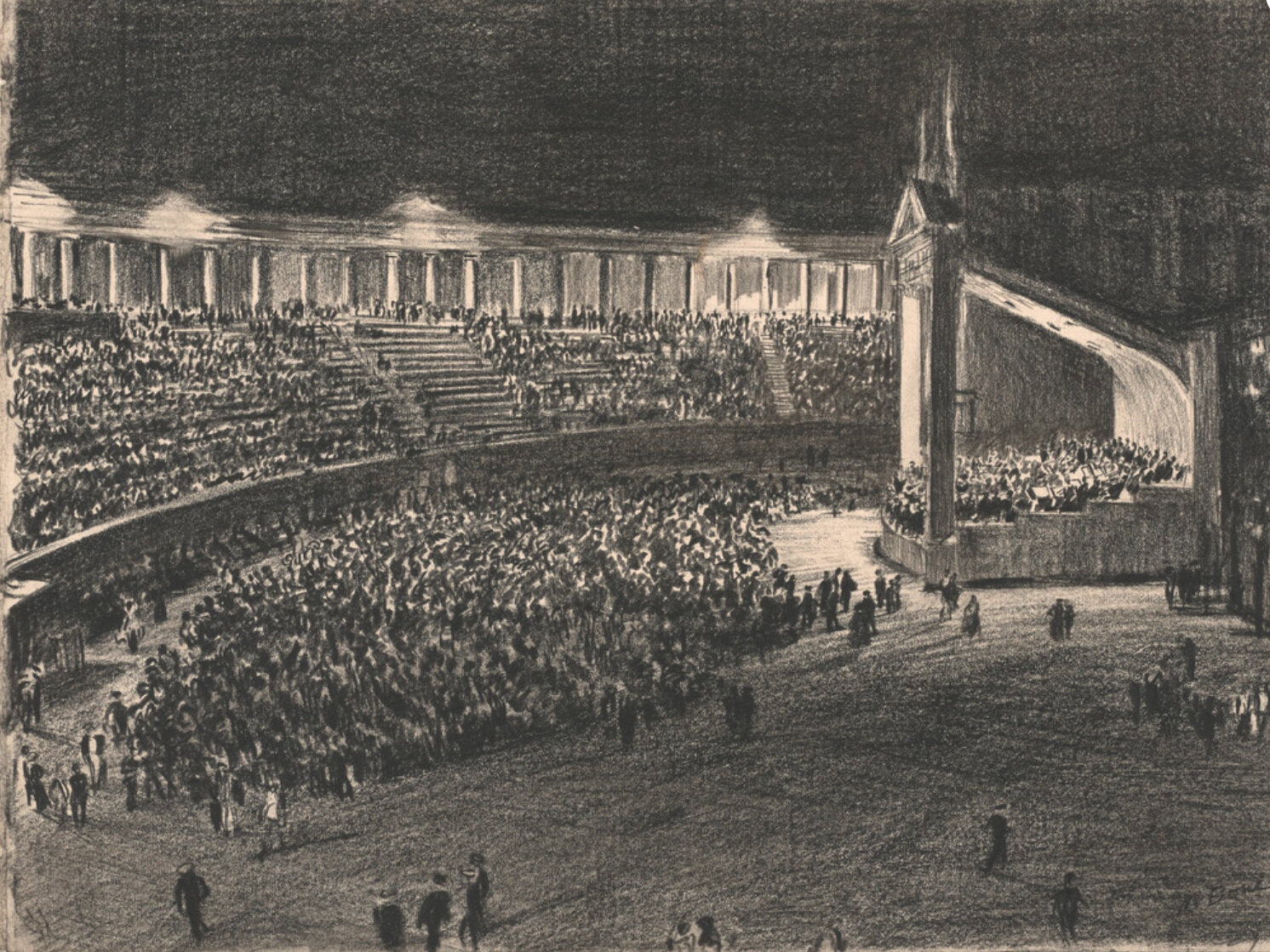A Summertime open-air concert series
THE CONCEPT OF “POPULAR MUSIC” UNDER DISCUSSION
One hundred years ago today … New Yorkers craving outdoor music could attend the summer series of open-air concerts by the National Symphony Orchestra conducted by Walter Rothwell, held at City College’s Lewisohn Stadium, between 136th and 138th, Amsterdam and Convent Avenues (which we last mentioned as the site of an assimilationist July 4 event).
Bone, Sir Muirhead. “Night scene during a concert. The orchestra stand at the right and tiers of seats and colonnades at left and centre.” Charcoal drawing. Boston Public Library, Digital Commonwealth. Ca. 1889–1924.
New York Times, 29 July 1920, p. 7. Newspapers.com.
New York Tribune, 25 July 1920, p. 35. Newspapers.com.
The series comprised nightly concerts at 8:30. Halfway through its third season, it was peaking in popularity, averaging roughly 6,000 attendees per night; this is according to the Tribune’s enthusiastic review which proclaims that the series “has placed New York at the head of cities where open air concerts are staged.”
The Tribune reviewer finds the audiences interesting, highlighting the attendance of Italians, Germans, but especially the “strong Jewish element”: “These people crave music and come early and sit through the concerts devotedly.” As for clothes: “evening dress is rather out of place.”
The reviewer’s main purpose is to laud the “high standard” of the season, in contrast with earlier years’ emphasis on more accessible, “popular” programming. This year, “the meaning of ‘popular’ has been somewhat deflected … good music, the management found, was ‘popular.’”
The article offers substantial remarks on this theme from “Mrs. Charles S. Guggenheimer” (Minnie Guggenheimer).
We had the idea when we brought Mr. Walter Henry Rothwell from Los Angeles and gave him carte blanche for an orchestra of nearly 100 pieces that music of the very first order … was what New York wanted to-day–not the popular music, not music that would be a concession to “movie fans.”
Minnie Guggenheimer, born Minna Schafer, had been the primary organizer, donor and fundraiser for the summer concerts since its two-week-long debut season in 1918. She frequently offered announcements during concert intermissions, apparently becoming quite popular herself, perhaps because she misspoke frequently enough that according to one source she earned the nickname “Mrs. Malaprop of 20th-Century America.”
Guggenheimer’s daughter, Sophie Guggenheimer Untermeyer, wrote a biography of her mother, Mother Is Minnie (1960).
Thanks to the work of Guggenheimer and others, the series lasted into the 1960s.
The Lewissohn series frequently featured guest singers; July 29’s would be Marguerite Namara of the Chicago Opera, who would spend the remainder of 1920 performing in NYC, including at the season-ending gala of the Lewissohn concerts on August 20.
Namara also starred in movies. Her biggest 1920 release was Stolen Moments, noteworthy in part for featuring Rudolph Valelntino in what would turn out to be his final villain role.
America Cinema Corporation. Wikicommons.
Still from James Vincent, dir. Marguerite Namara and Rudolph Valentino in Stolen Moments. America Cinema Corporation, 1920. Vague Visages.
You can watch a clip of the movie on YouTube.
WRITTEN BY JONATHAN GOLDMAN, JULY 29, 1920.
TAGS: outdoor music, concerts, Lewisohn, movies, cinema






